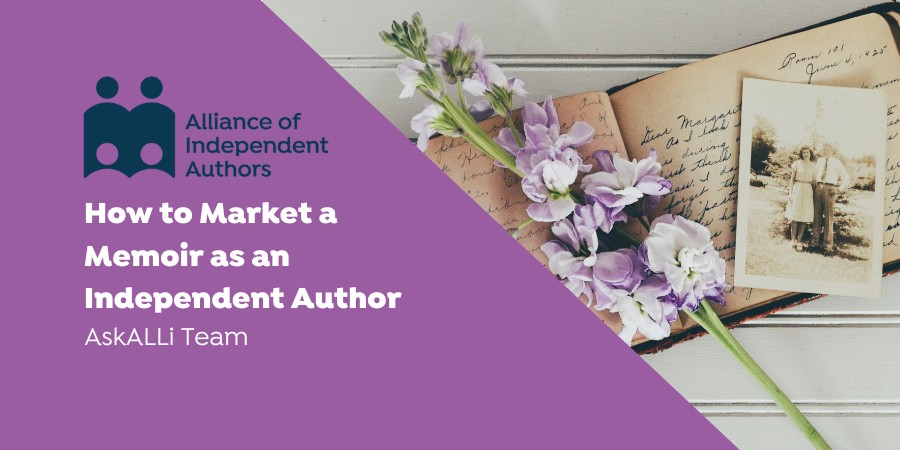
Photo by Campaign Creators on Unsplash
As an independent author, the task of marketing your memoir may leave you wondering “Now that my story is written, how do I get it out there?” But with the right strategies, you can build a marketing plan that will reach your readers and boost your book sales.
In this Alliance of Independent Authors post we'll share nine questions you can ask yourself to build a successful marketing plan for your memoir. Scroll straight down for tips and case studies from two top indie memoir writers who share what’s worked for them: Rachael Herron and Roz Morris.
Who is your memoir for?
Before diving into marketing strategies, it's crucial to understand who your readers are.
Memoirs can resonate with a diverse range of readers, from individuals seeking inspiration to those looking for relatable experiences or to learn about a specific topic or event.
Identify the demographics, interests, and motivations of your potential readers. Are they young adults searching for coming-of-age stories? Parents navigating the challenges of raising a family? Retirees reflecting on a lifetime of experiences? Travellers looking to be inspired for their next journey?
Spend time listing the different groups who may be right for your memoir. You can even create profiles of the key groups to help you consider who they are, where they are and how you can reach them.
What is the unique selling proposition for your memoir?
Your Unique Selling Proposition (USP) is what distinguishes your story from others. It could be the distinctive perspective you as the author offer, your new take on a universal experience, the challenge you have overcome, or the authenticity of your voice.
Your USP should be clear across all of your marketing content, from your compelling tagline and description to your book cover design, and your comments in interviews. Ensure you know what makes your memoir a must-read and thread it through all of your marketing activity to reinforce the key USP at all times.
Have your built a strong author platform?
 Your author platform is the foundation of your marketing strategy. It encompasses your ongoing presence as an author, such as your website, your social media profiles, and your email list.
Your author platform is the foundation of your marketing strategy. It encompasses your ongoing presence as an author, such as your website, your social media profiles, and your email list.
From the outset, ensure you have set a strong and clear author platform. As a start, a professional website is a must. This will communicate messages about your book, but should also offer a space where readers can find out more about you as the author and a person.
Ideally before your launch, build your email list so you can connect directly with potential readers and keep them informed about upcoming events, promotions, and your new release. Promote your email list wherever you can. It may start small, but it will grow. Remember to follow local rules around adding people’s data to your list.
You can find out lots more about building your list with recent episodes of the ALLi Reaching More Readers podcast with Dale L Roberts and Holly Greenland: Reaching More Readers Podcast
Have you collected credible reviews?
Reviews are crucial for establishing credibility and generating buzz around your memoir.
Encourage readers to leave reviews on platforms like Amazon, Goodreads, and BookBub from the day of launch. Offer advance review copies (ARCs) to book bloggers, influencers, and literary reviewers in your topic area.
Positive reviews not only attract new readers but also increase your book's visibility in online algorithms, making it more likely to appear in search results and recommendation lists. Reviews should always be honest and unpaid for.
Take a look at our guide ‘How to get your first 50 book reviews’ for more information. The book is available in our bookstore, or ALLi members can access the ebook for free.
Can you connect with influencers and collaborators to extend your reach?
Influencers and collaborators can amplify your marketing efforts by reaching a broader audience.
Identify individuals or organizations in your niche who align with your story and values.
Reach out to book bloggers, podcasters, and YouTubers who specialize in memoirs or topics related to your book. Offer to provide guest posts, interviews, or exclusive content for their platforms in the run up to and during your launch. They will often want to utilise your channels in return, so consider how you can help one another spread the word about your books.
Have you optimised your sales information?
Consider Search Engine Optimisation across all of your online information. This is how search engines such as google, and also search facilities within online sales platforms, find your book when someone makes a search that is relevant.
Check that you have used key words and phrases that your readers will search for, ideally multiple times across the sales information.
Take a look at sales descriptions from any similar books to yours. How does yours compare? Have they used phrases you could also incorporate? What is the tone they have set and can you learn from it?
Have you explored all the marketing channels open to you?
First off, consider your social media channels as routes to sharing your journey prior to and during launch. The immediacy of social media means you can share behind the scenes information about how you work, snippets from your memoir and even cover reveals ahead of the launch itself. Use hashtags of relevance to your memoir to help people find your social content.
Depending on your memoir’s topic, you may feel it’s also suitable to produce multimedia content, such as a short video book trailer, or an audio recording – like a podcast – with you showcasing your memoir in a dynamic and engaging format.

Photo by Naadir Shahul on Unsplash
While online promotion is essential, don't overlook alternative and traditional marketing channels that can help you reach new readers.
Consider partnering with book clubs, schools, libraries or reading groups to introduce your memoir to their members and visitors. If your memoir has a specific theme, find groups who would be interested in it and offer to speak or run a workshop for them. And if you have a local angle, radio stations, papers and local websites will often take a strong interest in you and your story.
You can also share your details with literary festivals, conferences, and community events that suit your work, offering to take part in events or panel discussions.
- Can you offer your readers value beyond your book?
In today's competitive market, any extra value you can add may make the difference when someone is considering a purchase.
Can you offer value beyond the pages of your memoir by creating supplementary content that enriches the reader's journey?
Depending on the themes in your memoir, this could include discussion guides, bonus chapters, author commentary, or multimedia resources related to the topics in your book.
This additional content could be shared with your audience through free downloadable guides, short videos or podcasts to extend the theme, interactive Q&A sessions, or virtual book clubs. It can also provide a ‘reader magnet’ to inspire people to sign up to your mailing list.
- How will you know your plan has been a success?
Marketing your memoir is an ongoing process that requires constant evaluation and adaptation.
Track your marketing efforts using analytics tools to measure key performance indicators such as website traffic, social media engagement, book sales, and reader feedback.
Identify which strategies are most effective in reaching your goals and invest more resources in those areas. Be open to experimentation and innovation, continuously refining your approach based on audience feedback and market trends.

Case Study One: Rachael Herron
Bestselling Memoirist Rachael Herron shares her three biggest tips based on real-world experience marketing memoirs.
Be yourself. Everywhere.
The point of selling your memoir is to sell you, your specific voice. Don't try to be one person on Instagram and another on LinkedIn. Your authenticity is what readers want most.
Speaking of that authenticity, be specific.
Almost counter-intuitively, memoir readers find themselves in the specificities of your life. Don't say blandly, “Be inspired by this true story of hope,” but rather, “Rachael's dual addictions to boxed white wine and Vanderpump Rules will inspire you to find your own inner dragon egg.” Who doesn't want to watch someone else go astray? And find a dragon egg? Bring it on.
Collect readers, no matter what.
Give anyone who connects with your writing, whether that's in a magazine article or your book or a book event, a reason to sign up for your mailing list. I've worked with so many writers who knew they had just one memoir inside them. Guess what? About six months after that book is published, most of them find the next book lurking inside their bones (like a dragon egg). With a mailing list, you'll be able to tell your readers about the next thing you have for them to buy. Trust me, even if you think you'll never utilize it, just set up that mailing list. There are plenty of email newsletter services that are totally free to use for the first few hundred subscribers, start with one of them!
Rachael Herron is the bestselling author of Fast-Draft Your Memoir, which is based on the semester-long class she has taught at Stanford's extension program. As well as multiple memoirs, she's written dozens of novels, too. She lives in Wellington, New Zealand with her banjo-playing wife and brick-eating dog. Join her writer's email list of encouragement HERE and get all her tips and tricks for memoir, revision, and getting your work done even when you don't want to!
Cast Study Two: Roz Morris
 I wrote a travel memoir, Not Quite Lost: Travels Without A Sense of Direction. It’s a diary of humorous low-key adventures around various parts of the UK, usually out of season, usually in filthy weather, and encounters with eccentric people. I realised this was exactly the kind of material that would go down well on BBC local radio stations, especially their lunchtime programmes. Local radio loves human interest stories, so most memoirs would probably get a good reception.
I wrote a travel memoir, Not Quite Lost: Travels Without A Sense of Direction. It’s a diary of humorous low-key adventures around various parts of the UK, usually out of season, usually in filthy weather, and encounters with eccentric people. I realised this was exactly the kind of material that would go down well on BBC local radio stations, especially their lunchtime programmes. Local radio loves human interest stories, so most memoirs would probably get a good reception.
My book covered several counties, so that gave me several bites at the cherry. I identified the BBC radio stations in those areas and found the names of the programme producers. Then I imagined how presenters might introduce the interview to get listeners’ interest and tailored each email to the station’s patch, so that presenters could easily see they could get a 20-minute segment from a chat with me.
Here’s an example:
What's the worst place you could be stranded with a malfunctioning car window? Where is the power station that mysteriously magnifies on a foggy night? They're both in Lincolnshire, and the answers can be found in my new book of humorous and quirky travel tales – Not Quite Lost: Travels Without A Sense of Direction, published by Spark Furnace.
Would their listeners like the book? Fortunately I had strong recommendations from readers, including a comparison with the grandee of affectionately bumbling explorations, so I included those. ‘Fans of Bill Bryson have given it a strong thumbs-up for its Englishness, its love of eccentricity and its wry humour. Here’s a selection of early reviews on Goodreads.’
I headed each email ‘Book of local interest – Not Quite Lost: Travels Without A Sense of Direction’ so the content could be seen at a glance.
 While I was researching I received a rave review from Country Walking magazine, so I included a PDF of that with my email for added kudos. I also included the cover and the advance information sheet, which are standard documents that publishers send to potential publicity contacts.
While I was researching I received a rave review from Country Walking magazine, so I included a PDF of that with my email for added kudos. I also included the cover and the advance information sheet, which are standard documents that publishers send to potential publicity contacts.
What did the hard work achieve?
I got six live interviews, five of them done down the line at Wogan House in central London. For the other, I travelled to the BBC studios in Bristol because they liked guests to be live in the studio.
I pitched a couple of national stations as well and nearly got a spot on BBC Radio 4’s Saturday Live. I was on standby, but then they changed the programme line-up. The interview would have been with Richard Coles, which, my dears, gave me such enjoyable palpitations, but alas it wasn’t meant to be.
But my six other interviews were great ammunition. Once I had dates I approached independent bookshops in those areas, letting them know the book would be featured and where readers could order it. This took considerable time and I’ll never know if it was worthwhile because I only had a few direct replies, but it was a stone I didn’t want to leave unturned. If a reader came in and said ‘Have you got that book Something Lost that was on the radio the other day…’ I wanted the bookshop to think, ah, I know the book you mean. And marketing works by opportunities to see the product.
Memoir is brilliant material for local radio, especially the lunchtime shows which are looking for human interest stories. I’m now working on the follow-up to Not Quite Lost and I’ll definitely use this tactic again.
Roz Morris publishes literary fiction, creative non-fiction and writing craft books. She’s also ALLi's editor-in-chief. Find her books at her website rozmorris.org and tweet her on @Roz_Morris
Conclusion
By understanding your audience, crafting a compelling narrative, and utilising a variety of marketing strategies, you can effectively market your memoir and connect with readers.
Remember, the journey doesn't end with writing the book; it's just the beginning of sharing your story with the world. Embrace the opportunities, stay resilient in the face of challenges, and let your memoir inspire and entertain others.
Thoughts or further questions on this post or any self-publishing issue?
If you’re an ALLi member, head over to the SelfPubConnect forum for support from our experienced community of indie authors, advisors, and team. Simply create an account (if you haven’t already) to request to join the forum and get going.
Non-members looking for more information can search our extensive archive of blog posts and podcast episodes packed with tips and advice at ALLi's Self-Publishing Advice Center.
And if you haven’t already, we invite you to join our organization and become a self-publishing ally.






